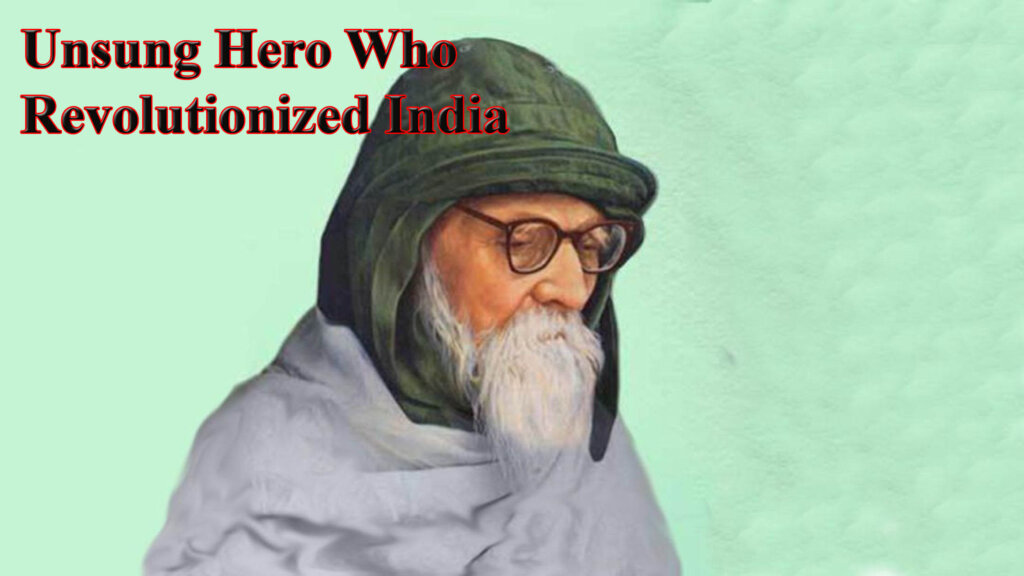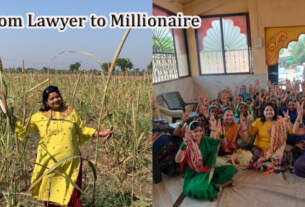By : Bhalakatha
Binoba Bhave, a name often overshadowed by other prominent figures in India’s struggle for independence and social reform, was nevertheless a stalwart whose legacy has left an indelible mark on the country’s history. A tireless advocate for nonviolence, rural development, and social justice, Binoba Bhave’s life and work embody the principles of Mahatma Gandhi, with whom he shared a profound association. This essay explores the life, ideals, and enduring influence of Binoba Bhave, the “Acharya” of the Bhoodan (Land Gift) Movement and a key figure in India’s post-independence era.
Early Life and Education
Vinayak Narahari Bhave, later known as Vinoba Bhave or simply Binoba Bhave, was born on September 11, 1895, in the village of Gagode in Maharashtra, India. He hailed from a devout Brahmin family and demonstrated intellectual curiosity from an early age. After completing his primary education in the village, he moved on to study at the Nutan Marathi Vidyalaya in Nashik. It was during his time there that he came into contact with the works of Swami Vivekananda and Annie Besant, two influential figures in the Indian spiritual and nationalist landscape.
The Call of Mahatma Gandhi
Binoba Bhave’s life took a transformative turn in 1916 when he attended a lecture by Mahatma Gandhi. Inspired by Gandhi’s principles of nonviolence, social justice, and the fight for India’s independence from British colonial rule, Binoba became a devoted follower of the Mahatma. He subsequently joined the Non-Cooperation Movement (1920-1922) and worked alongside Gandhi in several key campaigns, including the famous Salt March of 1930.
Binoba’s dedication to Gandhi’s ideals extended to the constructive program, which emphasized self-reliance, community development, and upliftment of the marginalized sections of society. He tirelessly engaged in activities such as spinning, weaving, and promoting Khadi (hand-spun cloth) as a means of economic self-sufficiency for rural India.
Acharya of Bhoodan Movement
However, it was in the post-independence period that Binoba Bhave’s most significant contributions came to the fore. In 1951, he launched the Bhoodan Movement (Land Gift Movement) with a simple yet profound objective: to persuade landowners to voluntarily donate a portion of their land to landless farmers. This movement was not just about redistributing land; it was about addressing the deep-rooted issues of land ownership, social inequality, and rural poverty.
The Bhoodan Movement quickly gained momentum across India, drawing supporters from all walks of life. Binoba embarked on foot journeys (known as “padyatras”) that covered thousands of miles, walking from village to village, appealing to landowners to share their land with the landless. His commitment to nonviolence and moral persuasion made a profound impact, and thousands of acres of land were donated through this movement.
The Gift of Sarvodaya
Binoba Bhave’s philosophy was deeply rooted in the principles of Sarvodaya, which translates to “the welfare of all.” Sarvodaya sought not just economic equality but spiritual and moral upliftment as well. Binoba believed that true development could only be achieved when it uplifted the entire society, especially its most vulnerable members.
He emphasized the importance of Gramdan, wherein a village community collectively owned and managed its resources, including land. This approach aimed to create self-sufficient, self-governing, and cooperative villages. In 1954, Binoba Bhave initiated the “Acharya Vinoba Bhave’s 40-day Fast” to promote land reforms and push for the transfer of land to the landless. His fast garnered widespread attention and led to significant land reform initiatives in several states.
Impact and Legacy
The impact of Binoba Bhave’s efforts in rural development and land reform cannot be overstated. The Bhoodan Movement and Gramdan concept inspired social activists, politicians, and thinkers across India and beyond. It led to a renewed focus on land redistribution and equitable access to resources, which were critical for the welfare of rural communities.
Binoba’s influence extended to various social and political leaders, including Prime Minister Jawaharlal Nehru and his daughter, Indira Gandhi. He played a pivotal role in shaping policies related to rural development and land reform in India.
Moreover, his commitment to nonviolence as a means of social and political change resonated deeply with the broader Gandhian philosophy. He exemplified how nonviolence, when practiced with unwavering dedication, could bring about transformative social change.
A Beacon of Nonviolence
In addition to his work in rural development, Binoba Bhave was a strong advocate for nonviolence in resolving conflicts. He believed that nonviolence was not merely the absence of physical violence but also the absence of hatred and enmity in one’s heart. His advocacy for nonviolence extended to issues such as the abolition of the death penalty and the promotion of communal harmony.
Binoba’s principled stand on nonviolence made him a prominent figure in national and international peace movements. He received the Ramon Magsaysay Award for Community Leadership in 1958, further recognizing his contributions to nonviolent social change.
Conclusion
Binoba Bhave’s life journey from a small village in Maharashtra to becoming a leading exponent of nonviolence, rural development, and social justice is nothing short of remarkable. His dedication to Mahatma Gandhi’s ideals, his role in the Bhoodan Movement, and his advocacy for Sarvodaya have left an enduring legacy that continues to shape India’s social and political landscape.
Today, as India faces complex challenges related to land ownership, rural development, and social inequality, the teachings and actions of Binoba Bhave remain relevant and inspirational. His commitment to nonviolence as a means of effecting positive change serves as a timeless reminder of the enduring power of principles over mere force.
In the annals of history, Binoba Bhave stands as a beacon of hope, a testament to the potential for one individual’s unwavering commitment to transform society and champion the cause of the marginalized and oppressed. His life’s work echoes the profound truth that the path of nonviolence, compassion, and selflessness can lead to lasting and meaningful change in the world.





